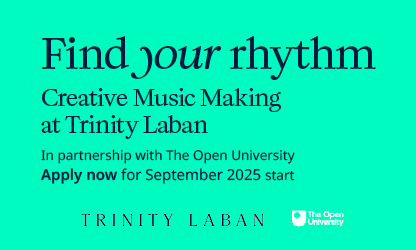Corporate member blog: Music inspires us
Piers McLeish, co-founder of ChoirCommunity, shares his thoughts on inspiration ahead of a milestone celebration.
Music is humanity’s universal language, a form of artistic expression which probably dates back to the start of our development as a species. Considering music’s power to inspire us, it is no wonder that it has also been used to affect social change.
The earliest record of this dates back to the ancient Greeks - Plato wrote about the power of music to move the masses. Music has been behind some of the most profound and fundamental changes in the way societies have formed and re-formed themselves.
Throughout history, it is probably a close race between religion and war for the prize of what purpose music has been used most to inspire us. From the Gregorian chants of 550 AD to the polyphonic church music of Europe, music has connected people to their faith. Parallels to this are prevalent in almost all of the world’s religions. 'Amazing Grace', written by John Newton in 1772, is an example of music’s power to move people to faith, as it's still popular even 250 years after its composition.
'Music has been behind some of the most profound and fundamental changes in the way societies have formed and re-formed themselves.'
Perhaps even before religion, music has been used to inspire courage in the military. The ancient Greeks and Romans used trumpets to urge soldiers on and intimidate enemies. During the Middle Ages, troubadours travelled with knights and armies and composed songs of valour and chivalry to inspire them. In the Second World War, the newly-invented radio enabled music to reach the front lines as well as bolster support for the war effort back home.
More recently, music has been used for political and social purposes. Protest music has been a powerful force in fighting for those marginalised in society, such as the Civil Rights Movement, Women’s Suffrage, Free Speech, Gay Liberation, and anti-war protests. Seminal songs became associated in the public consciousness with those struggles, which has allowed the music to endure beyond the political movements themselves.
An organisation that recognises music’s societal power is the Royal National Lifeboat Institution (RNLI), which is celebrating its bicentenary throughout 2024. One of its many initiatives for this milestone is 'Sing To Save Lives', where choirs up and down the country (and perhaps also abroad) will be putting on concerts with a maritime theme to celebrate and inspire.
ChoirCommunity is supporting this initiative by providing a library of suitable repertoire from which choirs can build a concert programme. Head over to the ChoirCommunity website to find out more and to register your choir for the event.
As it happens, a beautiful new version of 'Amazing Grace' by Fiona Lander is one of the pieces of music you can try, so start getting inspired!
Making Music members benefit from a 15% discount on ChoirCommunity music sheets and learning tracks – check out the offer.



